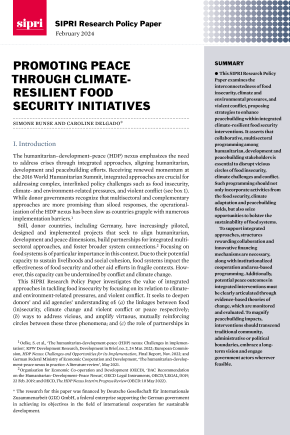Promoting Peace through Climate-resilient Food Security Initiatives

This SIPRI Research Policy Paper examines the interconnectedness of food insecurity, climate and environmental pressures, and violent conflict, proposing strategies to enhance peacebuilding within integrated climate-resilient food security interventions. It asserts that collaborative, multisectoral programming among humanitarian, development and peacebuilding stakeholders is essential to disrupt vicious circles of food insecurity, climate challenges and conflict. Such programming should not only incorporate activities from the food security, climate adaptation and peacebuilding fields, but also seize opportunities to bolster the sustainability of food systems.
To support integrated approaches, structures rewarding collaboration and innovative financing mechanisms are necessary, along with institutionalized cooperation and area-based programming. Additionally, potential peace outcomes in integrated interventions must be clearly articulated through evidence-based theories of change, which are monitored and evaluated. To magnify peacebuilding impacts, interventions should transcend traditional community, administrative or political boundaries, embrace a long-term vision and engage government actors wherever feasible.
I. Introduction
II. Food insecurity, climate- and environment-related pressures, and violent conflict: Current knowledge
III. Turning vicious circles into virtuous ones: The value of integrated approaches with stronger peace dimensions
IV. Programming implications for aid agencies
V. Recommendations and ways forward

